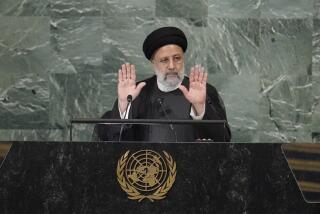Iran No Longer Demands Hussein Ouster to End War
- Share via
UNITED NATIONS — In an apparent softening of position, Iran’s deputy foreign minister said Monday that the ouster of the Saddam Hussein regime in Iraq is no longer an Iranian precondition for peace negotiations and that Iran is ready to deal with the United Nations on trying to end the Persian Gulf War.
“We don’t care what kind of government is in Iraq, but we insist on our rights,” Mohammed Jawad Larijani told a news conference after a meeting with U.N. Secretary General Javier Perez de Cuellar. “That should be decided by the people of Iraq.”
Then he added with a smile:
“But if you ask me to make a political forecast, I don’t think it (the Hussein regime) can survive.”
Since the beginning of efforts to end the nearly seven-year-long war, Iran’s leadership--particularly the Ayatollah Ruhollah Khomeini, the nation’s supreme leader--has insisted that because Iraq was the aggressor, Hussein would have to be ousted before a settlement could be reached. Larijani’s remarks may have represented only a cosmetic change in position, but the wording was a radical shift from earlier Iranian pronouncements on the subject.
Larijani also took a more conciliatory attitude toward the United Nations itself when he paid a visit to the current Security Council president, Ambassador Hans Werner Lautenschlager of West Germany. Iran in the past has frequently denounced the world organization and the council in particular, and it summarily rejected the “immediate cease-fire” in the war that the 15-member council unanimously called for July 20.
The cease-fire resolution was drafted by the five permanent members of the council--the United States, the Soviet Union, Britain, France and China--and while it contained no enforcement mechanism, it reserved the possibility of economic sanctions against either combatant who fails to conform.
Iraq has been receptive to peace efforts from the early days of the war but, in the absence of Iranian cooperation, has continued military action against Tehran.
The resolution requested that Perez de Cuellar initiate a fact-finding mission, but the Khomeini government failed to invite him formally to come to Tehran. Larijani said Monday that the secretary general has always been welcome but that a formal invitation is now on the way.
Larijani stopped short of saying that Iran would comply with the U.N. call for a truce. However, despite his government’s previous hostility to the council’s Resolution 598, he said “we hope that something can be cooked out of this resolution.” He repeated Iran’s earlier criticism of the resolution’s failure to label Iraq as the original aggressor, but he provided no other example of changes he would like.
Larijani also attacked the U.S. military presence in the gulf as provocative.
Showing ‘Muscle and Teeth’
“Every other day they show their muscle and teeth to us,” the bespectacled, bearded Iranian declared.
Asked if Tehran would refuse to negotiate while U.S. forces remain in the gulf, he replied:
“As long as the Americans are there intensively, how could you say that the area could be secure and safe?”
Hailing Iran’s new approach, Soviet Deputy Foreign Minister Vladimir Petrovsky, at a separate news conference here, urged that Iran’s “readiness to cooperate should receive serious consideration.”
But Petrovsky said he summoned reporters primarily to express his government’s alarm at the “disquieting situation in the Persian Gulf,” which he attributed to the “unprecedented military buildup by the United States and some of their NATO allies.”
Petrovsky said the presence of Western warships in the gulf creates “a greater probability of dangerous accidents which can cause an explosion. This action of the United States undermines the results of the collective work by all the members of the Security Council.”
More to Read
Sign up for Essential California
The most important California stories and recommendations in your inbox every morning.
You may occasionally receive promotional content from the Los Angeles Times.













